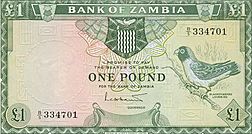Zambian pound facts for kids
Quick facts for kids Zambian pound |
|||
|---|---|---|---|
|
|||
| User(s) | Zambia | ||
| Subunit | |||
| 1⁄20 | shilling (s or /–) | ||
| 1⁄240 | penny (d) | ||
| Symbol | £ | ||
| Coins | |||
| Rarely used | 1d, 6d, 1/–, 2/– | ||
| Banknotes | 10/–, £1, £5 | ||
The Zambian pound was the money used in Zambia for a short time. It was used from when Zambia became independent in 1964 until January 16, 1968.
This currency was divided into smaller parts. One pound was equal to 20 shillings. Each shilling was then divided into 12 pence.
History of Zambia's Money
The Zambian pound took the place of the Rhodesia and Nyasaland pound. It had the same value as the old currency. The Zambian pound was also linked directly to the British pound sterling. This meant one Zambian pound was worth one British pound.
Later, on January 16, 1968, Zambia changed its money system. This change is called decimalization. The pound was replaced by a new currency called the Zambian kwacha. One Zambian pound was then worth two Zambian kwacha (ZK2). This also meant that one kwacha was worth ten shillings.
Coins of the Zambian Pound
New coins were made for the Zambian pound. In 1964, coins worth 6 pence, 1 shilling, and 2 shillings were introduced. These coins were made from a mix of copper and nickel.
In 1965, a 5 shilling coin was also added. Then, in 1966, 1 penny coins were introduced. These penny coins were made of bronze and had a hole in the middle.
Banknotes of the Zambian Pound
In 1964, the Bank of Zambia started printing paper money. They introduced banknotes in three different values. These were 10 shillings, 1 pound, and 5 pounds.
| Denomination | What was on the front? | What was on the back? |
|---|---|---|
| 10 shillings | Chaplin's barbet (a type of bird) | Farmers plowing with a tractor and oxen |
| 1 pound | Black-cheeked lovebird (another type of bird) | A mining tower and conveyor belts |
| 5 pounds | Wildebeest (a large animal) | Victoria Falls (a famous waterfall) |
 | Chris Smalls |
 | Fred Hampton |
 | Ralph Abernathy |


